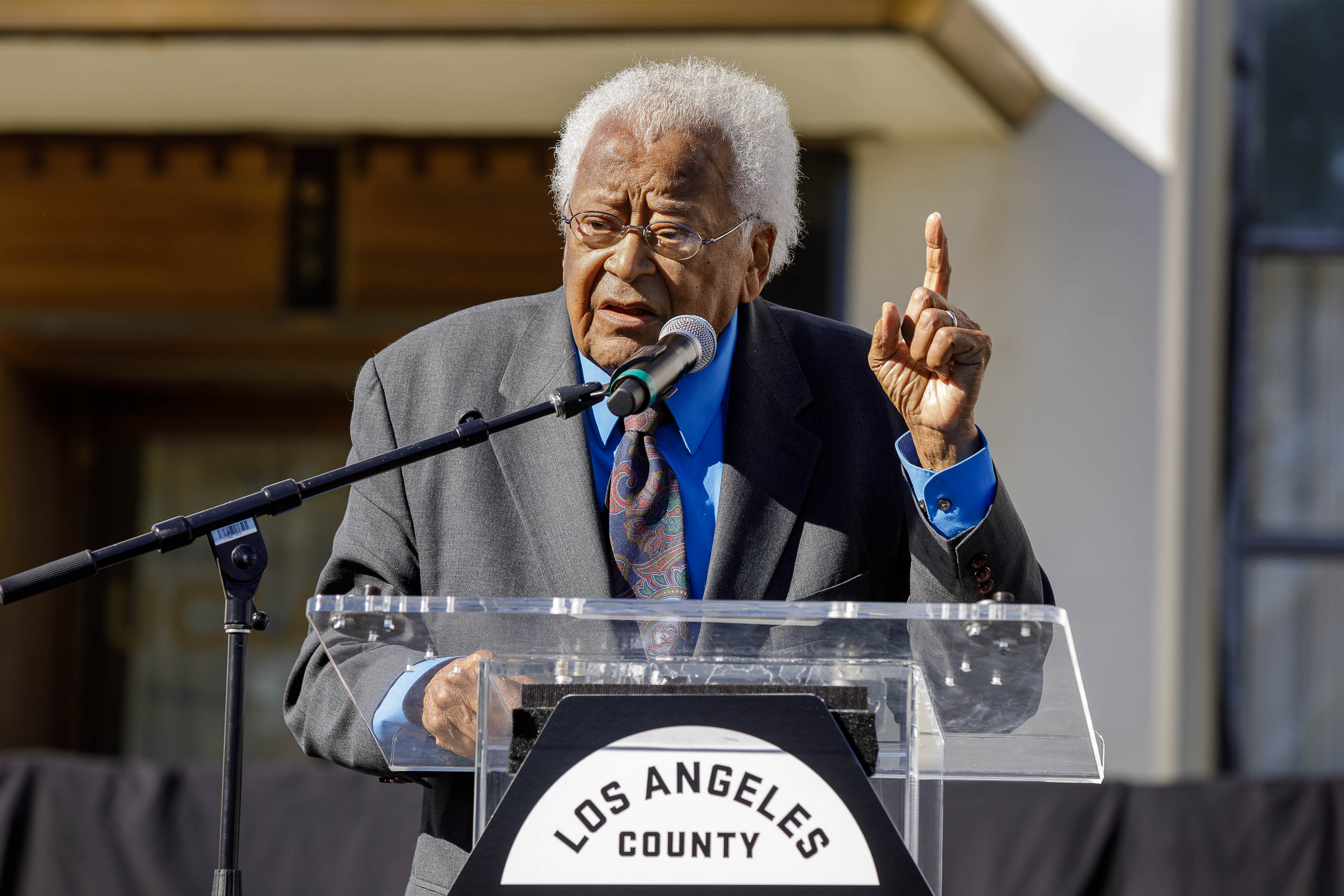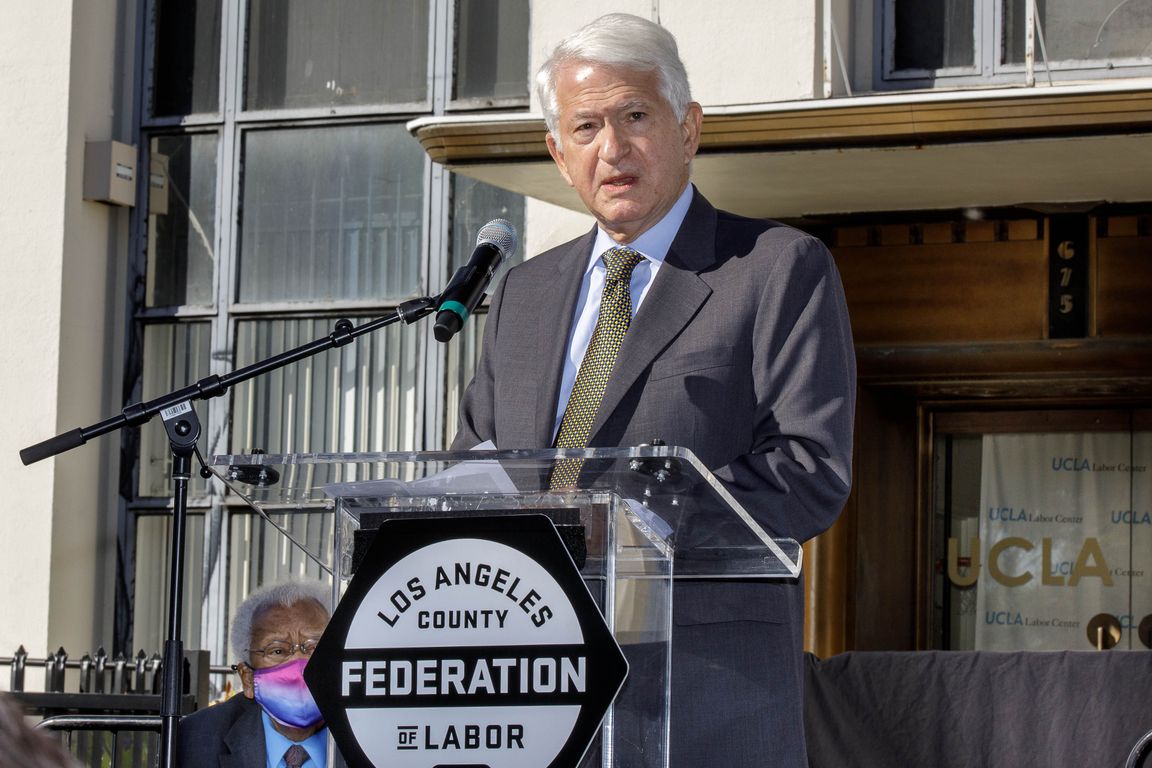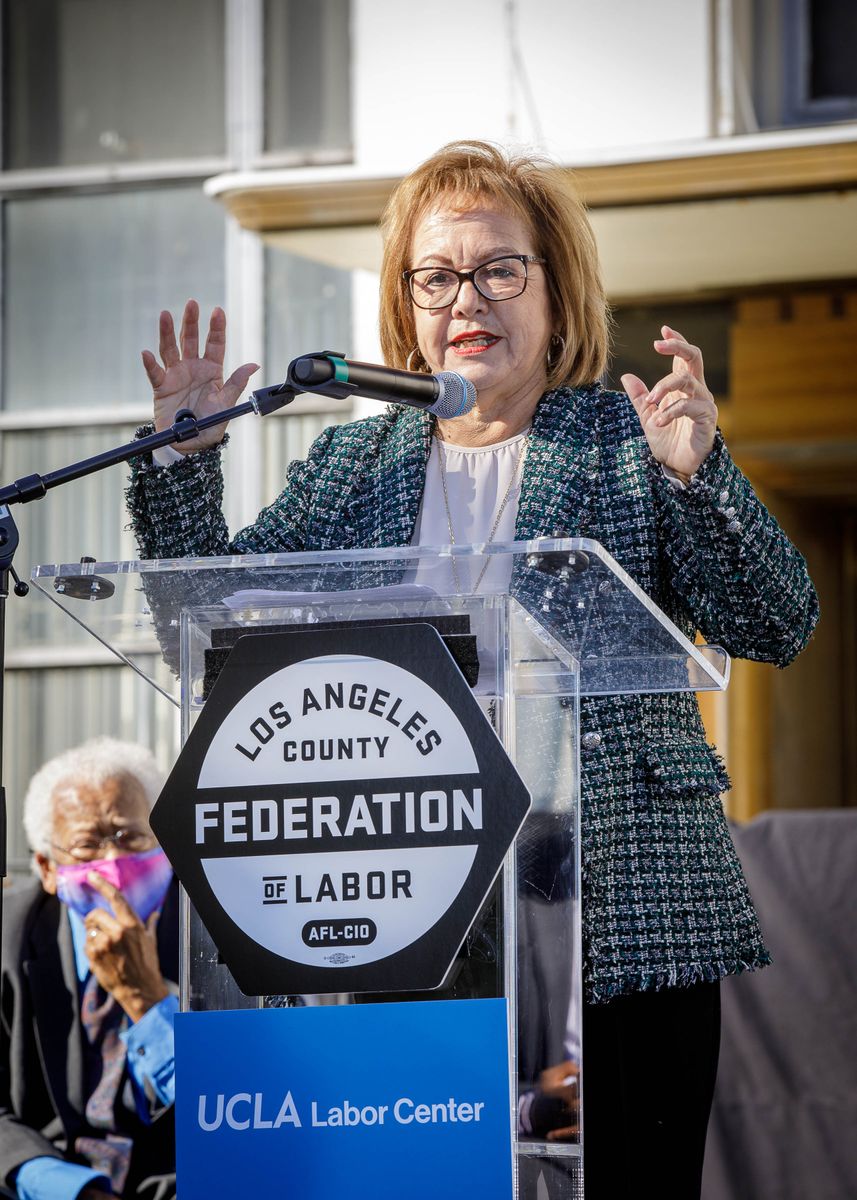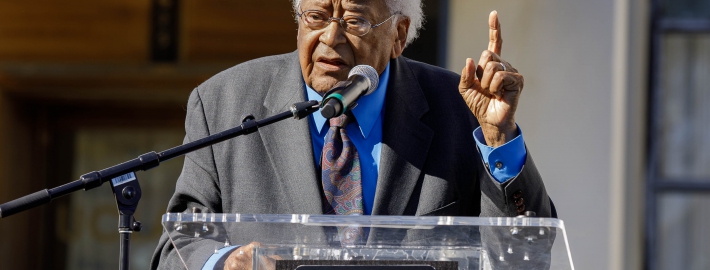UCLA dedicates labor center building to Rev. James Lawson Jr., champion of civil and worker rights
The building, which is now named in his honor, will house labor research, teaching and service for decades to come

Addressing the crowd at the ceremony, Lawson said, “Economic justice for every boy and girl of our 331 million people in the United States is perhaps the most daunting, complex issue we face.” Photo Credit: Reed Hutchinson/UCLA
By Citlalli Chávez-Nava
For a building dedicated to ensuring fair treatment and opportunities for workers and that is located in the heart of one of Los Angeles’ working-class immigrant neighborhoods, naming it after iconic civil and workers’ rights leader Rev. James Lawson Jr. was perfect.
On Dec. 11, the UCLA Labor Center’s historic MacArthur Park building was officially named the UCLA James Lawson Jr. Worker Justice Center in honor Lawson, one of the civil rights movement’s most-prominent leaders of non-violent protest and a UCLA labor studies faculty member.
“Throughout history, many of our greatest leaders have urged us to look inward,” UCLA Chancellor Gene Block said to the audience of 300 attendees at a ceremony hosted by the Los Angeles County Federation of Labor in partnership with the Labor Center. “They ask: Who are we as people? What do we value? What kind of society do we want, and what are we willing to do to build it?
“For over 60 years, James Lawson has invited Americans to consider such pressing questions. He has insisted that humanity’s salvation lies in reason and compassion, not violence or exploitation. His vision and valor have mobilized Americans, changed this nation, and inspired activists around the globe.”
Once referred to as “the mind of the movement” and “the leading strategist of nonviolence in the world” by Dr. Martin Luther King Jr., Lawson, now 93, is known internationally for teaching nonviolent resistance tactics to young activists. In the course of his life, Lawson and his colleagues and students led lunch counter sit-ins, freedom rides and worker strikes including the historic 1968 Memphis Sanitation Strike during the civil rights movement.
Lawson said he was humbled by UCLA naming a building in his honor.
“I had no idea how to prepare for this moment. For this extraordinary experience of all of you and the coalition that came together, to make this possible,” Lawson said. “On behalf of my wife, Dorothy, and her parents, and my parents and our great grandparents, and all on behalf of our sons, our grandchildren … we thank you very much, absolutely astonishing — I could never have imagined anything like this at all.”

Chancellor Gene Block speaks at the ceremony naming the building that houses the UCLA Labor Center in honor of the Rev. James Lawson Jr.
Photo credit: Reed Hutchinson/UCLA
Local Emmy-nominated R&B and gospel artist Ashly Williams sang “Lift Every Voice and Sing” to kick off the ceremony, which took place in front of the building, just a couple of miles away from the downtown Los Angeles skyline.
“I am proud to say that the Los Angeles County Federation of Labor signed on immediately in support of the $15 million allocation to establish a home for the UCLA Labor Center and to rename this building in your honor,” said Los Angeles County Labor Federation President Ron Herrera. “This investment, this building, will help energize the future of the Los Angeles labor movement.”
Guests included members of Lawson’s family, Los Angeles Mayor Eric Garcetti, Los Angeles County supervisors Hilda Solis and Holly Mitchell, state senators María Elena Durazo and Steven Bradford, State Controller Betty Yee, California State Assembly Speaker Anthony Rendon, assemblymembers Reggie Jones-Sawyer and Miguel Santiago, and Los Angeles City Councilmember Gil Cedillo, were among other community leaders, who spoke of Lawson’s unwavering commitment to advancing racial justice and worker rights.
“On behalf of this City of Angels, thank you to this angel,” Garcetti said. “Whether it’s in a sermon at Holman [United Methodist Church] or whether it’s in a private small conversation that I’ve had with [Rev. Lawson] at UCLA — and thank you to UCLA, Chancellor Block for having this center here — this man has shown us what it means to live in a city of angels in a world fighting for justice and in a city of belonging.”
UCLA faculty and administrators including Block, Dean of Social Sciences Darnell Hunt, Labor Center Director Kent Wong, labor studies students, clergy, members of Holman United Methodist Church and union members also attended.
A third generation Methodist minister, Lawson was born in Uniontown, Pennsylvania, and earned his local pastor’s license in 1949 during his senior year of high school. Shortly after graduating, he was drafted into the U.S. military but refused to enlist. As a conscientious objector, Lawson received a three-year sentence, and served 13 months in prison.
Following release from prison, Lawson traveled to India as a missionary where he studied the nonviolence teachings of Mohandas Gandhi. Upon returning to the United States in 1956, Lawson began to train and inspire a new generation of civil rights leaders including the late U.S. Rep. John Lewis, also a recipient of the UCLA Medal, campus’s highest honor. Lawson received the UCLA Medal in 2018.

California State Sen. María Elena Durazo was a student of the Rev. James Lawson Jr. Photo credit: Reed Hutchinson/UCLA
In 1974, Lawson moved to Los Angeles and became pastor of Holman United Methodist Church where he led his congregation to mobilize for peace and social justice while contributing to the transformation of the Los Angeles labor movement. His work with the UNITE HERE Local 11 helped hotel workers achieve higher wages and improved working conditions by orchestrating nonviolent sit-ins, hunger strikes and civil disobedience protests. Soon after, Los Angeles labor organizers embraced similar tactics, which inspired a national movement for immigrant worker justice.
Durazo strategized with Lawson directly as a young leader at UNITE HERE Local 11 and has maintained her friendship with Lawson for more than 30 years. Inspired by his teachings, she led the effort to name the Labor Center building in his honor and unveiled the building’s signage bearing Lawson’s name to a standing ovation.
“Reverend Lawson’s lifelong advocacy, for social justice, for civil rights, for workers’ rights, for breaking down racist institutions will be honored through all the great organizing that I know is going to be done at this center over decades to come,” she said.
Wong, who has led the work of the UCLA Labor Center for the past 30 years and has co-taught alongside Lawson for the past 20 years, welcomed Lawson to the podium.
“Reverend Lawson has been our moral and our spiritual compass,” Wong said. “I’ve watched the transformation each year, as our students sit in awe and learn from Reverend Lawson, learn about his life, his teachings … how he has lived his life with principles and justice, and determination.”
In his address, Lawson recognized the unprecedented challenges facing the nation and how this moment would serve as a reminder of the urgent need to achieve economic dignity for all.
“Economic justice for every boy and girl of our 331 million people in the United States is perhaps the most daunting, complex issue we face,” he said. “But if we do not achieve it, if we cannot achieve it, we as the people, will have failed this extraordinary vision and mission that I personally have loved.”
Yet, he expressed hope in our human capacity to overcome our present challenges.
“If we can tap the great forces of life itself, and use those powers in the solving of the issues we face, we will discover the power of life itself in the power of the universe.”
Naming the building in honor of Lawson forms part of a $15 million effort to renovate the Labor Center funded by a one-time allocation in California’s 2021-22 state budget. The Labor Center was originally established in 1964 within the UCLA Institute of Industrial Relations, now the Institute for Research on Labor and Employment, through a statewide joint labor-university committee. Since its inception, the center has been dedicated to research, education and service in the interest of California workers.
In 2002, the Labor Center leased the building overlooking MacArthur Park to connect UCLA students and faculty to the broader Los Angeles worker community. Since then, it has focused on cutting-edge worker research, investigating topics such as wage theft, Black unemployment, immigrant workers, young workers and the gig economy. The center is also recognized for its innovative worker education and popular education programs and community-engaged learning within the economic justice movement and promoting a global workers’ rights agenda.
“We’re thrilled to help build a community asset that bears Reverend Lawson’s name. It will be a profound reminder of our obligation to advance research and policy solutions that advance worker and economic justice,” said Abel Valenzuela Jr., director of the Institute for Research on Labor and Employment. “The UCLA James Lawson Jr. Worker Justice Center will place Los Angeles and [the University of California] at the forefront of community engagement, academic research and a push for a worker centered economy.”
In honor of Lawson’s life and enduring legacy, early next year, UC Press will also release a book titled, “Revolutionary Nonviolence: Organizing for Freedom” featuring Lawson’s teachings on nonviolence.
This article originally appeared in the UCLA Newsroom. For more news and updates from the UCLA College, visit college.ucla.edu.


 Photo Credit: Reed Hutchinson/UCLA
Photo Credit: Reed Hutchinson/UCLA
 Courtesy of Isaac Gimenez
Courtesy of Isaac Gimenez